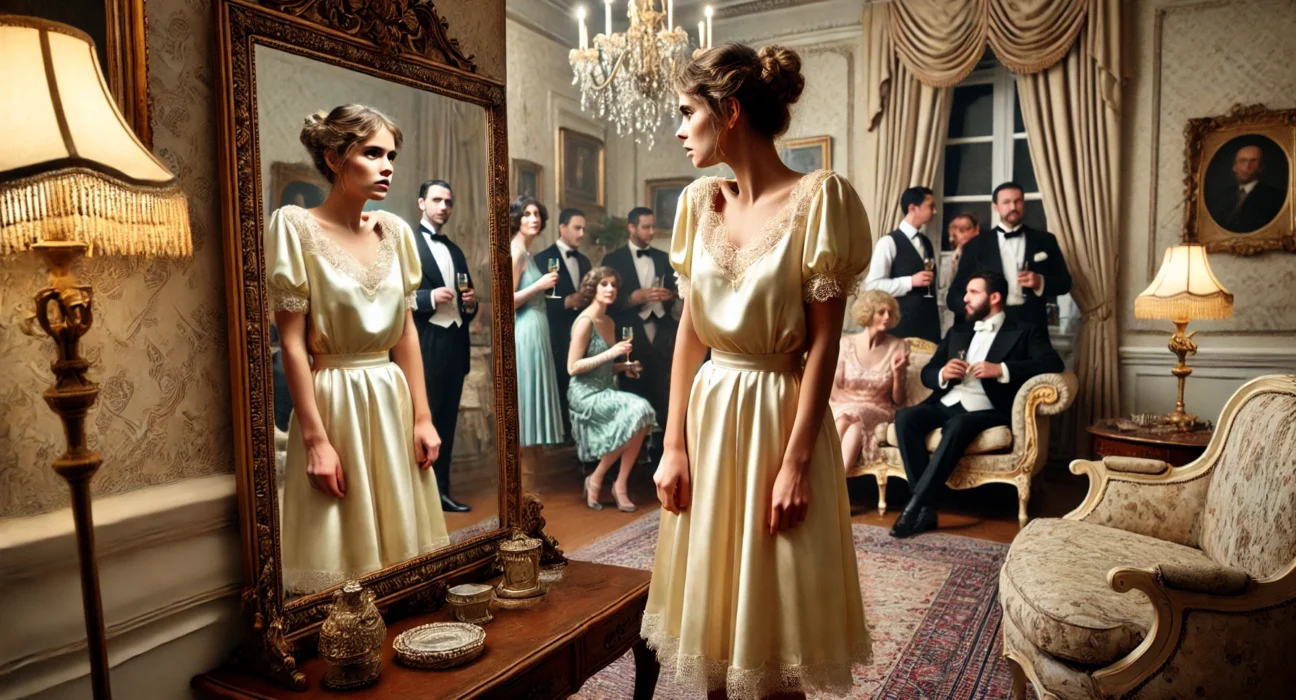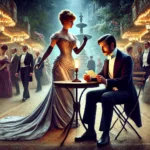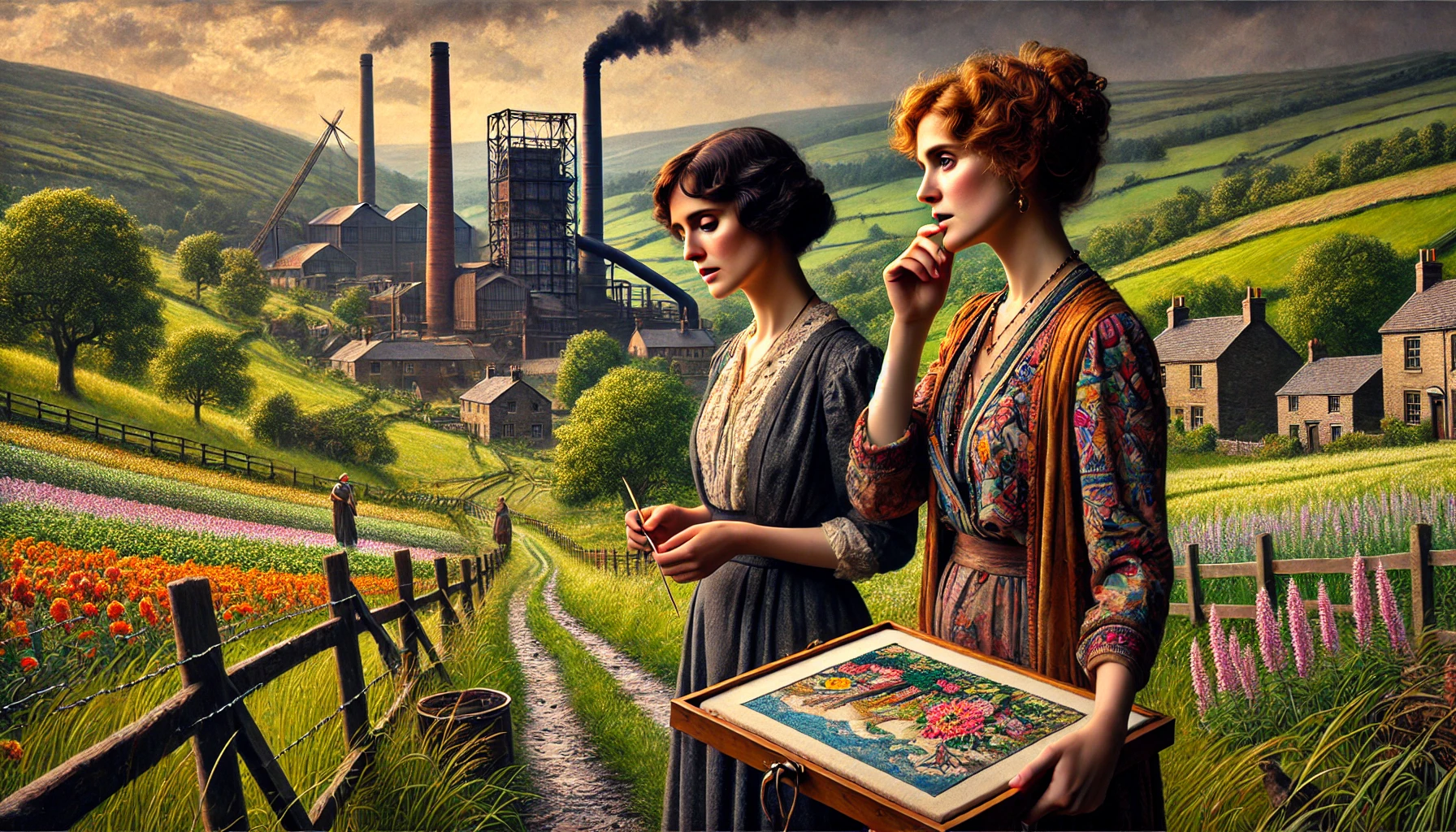“The New Dress” by Virginia Woolf, published in 1927, is a short story set in the vibrant social environment of London, exploring themes of insecurity, self-image, and social anxiety through the eyes of Mabel Waring, a woman attending a high-society party. Known for her profound psychological insights and stream-of-consciousness style, Woolf delves into Mabel’s inner turmoil, exposing her complex insecurities as she fixates on her perceived inadequacies amidst the superficial standards of the world around her.
Plot Summary
Mabel Waring arrived at the party with a mixture of hope and dread, her carefully selected dress—a pale yellow gown, cut from an outdated fashion book—cradling her in an awkward embrace of dreams and insecurities. It was supposed to be her chance to stand out, to be admired in her own modest way, and to feel, for once, as if she belonged in the social world around her. Yet, as she removed her cloak in the cloakroom and caught sight of herself in the mirror, she was struck by a surge of doubt. The gown, instead of making her feel elegant, made her feel exposed. It clung too tightly to the parts of herself she preferred hidden, and she could almost feel the silent judgments of those around her, imagining how they would glance at her with pity or disdain.
Clarissa Dalloway’s drawing room sparkled with all the finery of high society, but as Mabel scanned the room, her eyes were drawn to the glittering ease with which others wore their dresses, their skin glowing with a confidence she could never muster. Her own dress, intended to be a gesture of individuality and modest grace, now felt like a costume, something more suited to a long-past era than this bustling room filled with laughter and lively conversation. A pang of regret tightened her chest as she became keenly aware of her insignificance in the grand scene. She felt herself shrinking into her seat, a fly caught in a saucer, helpless and futile, trying to make sense of her place in this polished world.
Rose Shaw, a fashionable guest whose elegant attire mirrored the expectations of the evening, passed by, casting a gaze upon Mabel that felt both mocking and dismissive. Mabel’s heart sank. She longed for just a hint of approval, a momentary flicker of kindness, but instead felt the subtle sting of disapproval. She knew she wasn’t fashionable—fashion was beyond her reach, her upbringing too modest, her resources too limited. All she had to offer was her unique, albeit out-of-touch, attempt at originality, a style inspired by her mother’s old Parisian fashion book, a vision she had believed would make her look poised and dignified. But this belief had been an illusion, as frail as the stitching on her dress.
Memories began to surface as she sat there, reflecting on the quiet triumphs and hidden shames of her life. She remembered Miss Milan’s workroom, where the dress had come to life—a room filled with the scent of fabric and the warmth of shared anticipation. Miss Milan had fitted the dress with painstaking care, and for a fleeting moment, Mabel had felt beautiful, as if she could be someone worth noticing. Standing in front of Miss Milan’s mirror, she had felt the thrill of transformation, the possibility of stepping into a new self. But this moment of joy felt like a distant dream as she sat in Clarissa Dalloway’s crowded room, surrounded by people who seemed to float effortlessly while she struggled to breathe.
She tried to turn her attention to the guests around her, hoping to shake off the suffocating feeling that threatened to overwhelm her. Charles Burt approached, and she saw in him another chance for connection, perhaps a kind word that could pull her from the depths of her doubt. But his remark, lighthearted yet dismissive, reduced her to a mere spectacle—a woman in a dress that did not suit her, a curiosity to be laughed at, not admired. Her cheeks burned as she tried to laugh along, but inside, she felt the sting of each word as if they were arrows piercing her fragile self-image.
Around her, voices and laughter blended into a muted hum, each sound amplifying her isolation. She watched the other guests—young women in flowing gowns, men with easy smiles—and felt the chasm between herself and them widen. Her mind drifted back to her modest home, her small existence with Hubert and the children, where her days passed without fanfare or admiration. There, in the quiet of her own world, she found solace in small pleasures, in moments of calm by the seaside, the soft melody of waves breaking against the shore. These memories gave her comfort, a reminder that she was more than just her appearance, more than her awkwardness in a world that did not understand her.
The night wore on, and Mabel found herself unable to escape the weight of her own thoughts. She felt a creeping resentment toward the others who, unlike her, did not seem to struggle with self-doubt. She envied their ease, their comfort, and the unspoken unity that seemed to bind them together while leaving her on the outside. She knew that this bitterness was not fair; it was a fault within herself, a weakness she could not shake. She longed to be like them—unburdened, self-assured, and beautiful in a way that required no validation.
As her gaze drifted around the room, a new wave of determination began to stir within her. She told herself that she would change, that she would cast off the insecurities that weighed her down. Tomorrow, she would visit the London Library, find some book that would inspire her, fill her with courage and strength. Perhaps she would read about lives different from her own, stories of resilience and transformation. She would seek out something new—a lecture, perhaps, or a gathering of minds who cared for more than appearances. In her mind, she envisioned herself donning a uniform, taking on a role of importance, a life that would lift her above the confines of self-doubt and into a place of purpose.
With this vision fresh in her mind, she rose from the blue sofa and glanced into the mirror one last time. She saw not the flawed, inadequate woman she had feared, but a new version of herself, a woman preparing to leave the past behind. She waved to Charles and Rose, her final gesture to show she could stand on her own. She walked over to Clarissa, exchanged her farewells, and made her way to the door. The gown, the voices, the weight of the evening—all faded as she stepped out, her resolve carrying her forward. Wrapped in her old, worn cloak, she left the party and stepped into the quiet, night air, where her heart beat with the tentative hope of something new.
Main Characters
- Mabel Waring: Mabel is the protagonist, a middle-aged woman burdened by feelings of inferiority and social inadequacy. She wears a newly tailored, old-fashioned dress, hoping it will make her stand out. Instead, it becomes a symbol of her perceived lack of worth, propelling her into self-doubt as she navigates her role in society.
- Clarissa Dalloway: Although not a central character in this story, Clarissa is a prominent hostess, known for her elegance and social grace. Her presence symbolizes the standards of refinement and beauty that Mabel feels unable to meet.
- Rose Shaw: A young, fashionable guest who embodies the confidence and social fluency Mabel lacks. Rose’s casual judgment reinforces Mabel’s feelings of inadequacy, pushing her deeper into self-consciousness.
- Miss Milan: Mabel’s dressmaker, whose efforts help Mabel feel beautiful and confident, if only briefly. She represents a fleeting source of self-assurance in Mabel’s life, a reminder of the disparity between her aspirations and reality.
Theme
- Insecurity and Self-Perception: Mabel’s obsessive concern over her dress highlights her self-doubt and the impact of social judgments on her self-image. Woolf uses Mabel’s intense discomfort to explore the vulnerability that often lies beneath the surface of social gatherings.
- Isolation and Social Alienation: Although Mabel is surrounded by people, her feelings of loneliness are palpable. She perceives herself as a “fly in the saucer,” helplessly struggling for acceptance in a world where she feels she does not belong.
- Class and Social Expectations: Woolf subtly addresses the role of class and the pressures it imposes on individuals like Mabel, who feels constrained by her modest background and unable to embody the glamour that society demands.
- Ephemerality of Happiness and Self-Worth: Mabel experiences fleeting moments of joy and confidence, but they are fragile and easily shattered by the harshness of her internal and external environments. This transience of happiness speaks to the fragile nature of self-worth.
Writing Style and Tone
Woolf employs a stream-of-consciousness narrative that intimately connects readers to Mabel’s psyche, immersing them in her oscillating thoughts and emotions. This style brings a raw authenticity to Mabel’s reflections, allowing readers to experience the full intensity of her insecurities as she navigates the party. Woolf’s prose is richly descriptive and introspective, revealing the layers of Mabel’s inner life and the complex social web surrounding her. Her use of metaphors, such as Mabel’s self-comparison to a fly, powerfully underscores her feelings of entrapment and inadequacy.
The tone in “The New Dress” is both compassionate and unflinching. Woolf does not spare Mabel the painful realities of her social anxieties, yet she also provides glimpses of tenderness, particularly in Mabel’s memories and rare moments of self-acceptance. This balance creates an atmosphere that is simultaneously melancholic and insightful, encouraging readers to reflect on the universal struggles of self-perception and belonging. Woolf’s language is poetic and intricate, transforming Mabel’s quiet despair into a poignant exploration of human vulnerability.
We hope this summary has sparked your interest and would appreciate you following Celsius 233 on social media:
There’s a treasure trove of other fascinating book summaries waiting for you. Check out our collection of stories that inspire, thrill, and provoke thought, just like this one by checking out the Book Shelf or the Library
Remember, while our summaries capture the essence, they can never replace the full experience of reading the book. If this summary intrigued you, consider diving into the complete story – buy the book and immerse yourself in the author’s original work.
If you want to request a book summary, click here.
When Saurabh is not working/watching football/reading books/traveling, you can reach him via Twitter/X, LinkedIn, or Threads
Restart reading!








